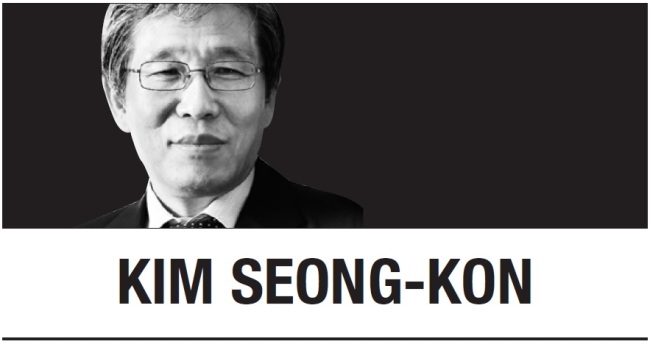[Kim Seong-kon] How to survive in a violent society
By Kim Seong-konPublished : Nov. 27, 2018 - 17:07
 These days, many people are concerned about violence in Korean society. There are many compelling reasons for such worries. For one thing, the country is sharply torn between groups that vehemently antagonize one another: conservatives versus radicals, the young versus the old, and men versus women.
These days, many people are concerned about violence in Korean society. There are many compelling reasons for such worries. For one thing, the country is sharply torn between groups that vehemently antagonize one another: conservatives versus radicals, the young versus the old, and men versus women. The country is also divided into the rich and the poor; the privileged and underprivileged; and between laborers and the managerial class. The Korean press, too, is divided into two ideologically distinct groups: the conservative media and the progressive media. Many Koreans’ internet homepages are also divided between rival companies Naver and Daum -- two politically different internet media giants.
One thing that foreigners find especially hard to understand is the undiminishing hatred between men and women, which is a uniquely Korean phenomenon. Men and women are supposed to be attracted to each other and fall in love. In Korea, however, men and women often hate each other. A recent incident at a subway station in Seoul is a good example. Newspaper reports said that a violent physical fight occurred between a group of men and women. They reportedly uttered indecent sexually offensive slurs at each other and eventually engaged in a physical fight.
We can bear politicians’ daily skirmishes in the political arena because that is what they do for a living anyway. We can understand the hatred between ideologically different people, too, because communism and capitalism are like oil and water. We can also stand the hostility between the haves and have-nots, even though it is irrational and undesirable. But few people can understand the abominable confrontation between men and women in Korea. How a man can find a woman repugnant or vice versa eludes foreigners. Unfortunately, however, it is happening in today’s Korea.
Indeed, few people would deny that violence is rampant in Korean society these days. Recently, a labor union member physically attacked a local government official who had stopped him from coming into the government building while demonstrating. An apartment security guard was beaten to death by a drunken resident. A middle school student fell from a building and was killed while running from a gang of students who had beaten him up for an hour. What is especially shameful is that those remorseless assailants are presumed to have bullied and attacked the boy because he came from a multicultural family: His mother was Russian.
There are invisible forms of violence in Korean society, too. Speaking ill of someone behind his back or discriminating against someone because he is not one of “ours” but comes from a different hometown, different schools or different factions is surely an invisible, but deadly form of violence. Criticizing or slandering someone anonymously on social media is another type of invisible violence. Not tolerating different opinions or threatening others is violence, too. When someone becomes a target of criticism and therefore is psychologically bleeding and wounded, we tend to viciously attack him and cut open his wound brutally, instead of helping him. All of these incidents contribute to making Korea a violent society both physically and spiritually.
In a violent society, you never know when you might become a victim of violence and that makes you feel uneasy and constantly nervous. Under the circumstances, you should be extremely cautious all the time. In a violent society, political dissidents are forced to keep silent because they may have to deal with violent consequences otherwise. Newspaper columnists are forced to exercise self-censorship for safety purposes, and those who have signed their names in protest against the government are reluctant to reveal themselves in public, so as to avoid possible retaliation from those who support the government.
Of course, not all men and women detest each other. Still, however, if the above tendencies are predominant, we should change the propensity and treat others with respect and manners. One of the marked tendencies of a civilized and advanced country is that it is a nonviolent society. In order to become a truly advanced nation, therefore, we should not tolerate violence and banish it from our society once and for all.
How does one survive in a violent society? It is virtually impossible to do so. Society and people should change and begin respecting others. Only then, can we live in a nonviolent, peaceful society.
Kim Seong-kon
Kim Seong-kon is a professor emeritus of English at Seoul National University and a visiting professor at the University of Malaga in Spain. He can be reached at sukim@snu.ac.kr -- Ed.


















![[Today’s K-pop] Treasure to publish magazine for debut anniversary](http://res.heraldm.com/phpwas/restmb_idxmake.php?idx=642&simg=/content/image/2024/07/26/20240726050551_0.jpg&u=)